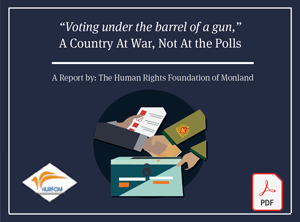Under the Shadow of a Staged Election, Civilians in Mon, Karen and Tanintharyi Face Escalating Repression and Fear
November 17, 2025
Across the targeted areas of the Human Rights Foundation of Monland (HURFOM), the Junta’s so-called election has brought not hope, but renewed fear. Instead of dialogue or political openness, communities are met with coercion, surveillance, and violence designed to force compliance with a process that has no legitimacy. The military is attempting to manufacture the appearance of “stability,” while the reality on the ground tells a very different story.
On 13 November 2025, HURFOM released its latest report, “Voting Under the Barrel of a Gun: A Country at War, Not at the Polls,” documenting the Junta’s intensifying efforts to manipulate the voting process. The report makes clear what communities have been saying for months: this election is illegal not only under international norms, but even under the junta’s own 2008 Constitution, which it now selectively weaponises against the very people it claims to represent.
In Mon State, authorities have tightened control to the point where even hesitation or silence is treated as dissent. Ward and village administrators, informers, and allied armed groups are working together to watch communities, monitor conversations, scan phones, and track social media activity. Local people describe a suffocating environment where any small act can be reported, investigated, or punished.
The arrest of 65-year-old U Kyaw Myint from Kwan Yike Village in Chaungzon Township is a painful example. He was taken away in broad daylight after being accused of removing an election notice listing junta-approved candidates. His family has been denied contact with him. A case was immediately opened under Sections 26(a)/24(a) of the military’s “Election Protection Law” a law created not to protect rights, but to suppress them. His only “crime” was being accused of touching a piece of paper that represents a forced vote under military control.
This is not an isolated event. Earlier in November, two residents in Hpa-an were arrested for allegedly damaging a campaign billboard belonging to the junta-appointed Karen State Chief Minister. Across the country, at least 107 people had already been charged under election-related laws in just the first week of the year. These arrests are not about protecting the election, they are about silencing the population and eliminating any sign of resistance.
Repression is unfolding alongside direct attacks on villages. On 9 November, Chauk Chaung Village in Tha Yet Chaung Township, Dawei District, was targeted by junta forces. Troops used drones to drop explosives before entering the community and burning homes. Around 100 soldiers advanced from the Win Wa Bridge checkpoint, destroying property and terrorising families caught between military aggression and ongoing conflict with Karen National Liberation Army (KNLA) forces. Witnesses described drones overhead, gunfire echoing through the village, and homes consumed by flames. This is the reality behind the junta’s claims of “pre-election security.”
In Yebyu Township, the violence was personal and brutal. On 5 November, Light Infantry Battalion No. 406 arrested 35-year-old Ko Phai Dit from Thar Yar Mon Village after accusing him of sharing information with resistance groups. Soldiers tied him with rope and beat him until he could no longer stand. His wife recalls him trying desperately to hide in a plantation out of fear, only to be discovered, interrogated, and tortured. His story is one of many, ordinary villagers suspected, detained, and abused because the junta views every civilian as a potential threat.
At the political level, the junta has also opened a case against the Karen National Union (KNU) Thaton District leadership, including its District Chair Padoh Saw Soe Myint and 22 others, for publicly rejecting the election. Criminal charges are now being used as a weapon against ethnic administrations and community leaders who refuse to legitimize a military process.
Together, these incidents paint a clear picture: this is not an election. It is an attempt to force submission under the threat of violence.
In Mon, Karen, and Tanintharyi regions, people know that participating in this process does not mean they have a voice, it means they have no choice. The junta’s staged “vote” is taking place in a country where civilians are bombed, houses are burned, landmines remain, and families fear arrest for simply expressing doubt. No amount of coercion can disguise the truth: Burma is at war, and elections organized at gunpoint cannot produce legitimacy.
As we approach the junta’s planned voting period, HURFOM urges the international community, UN bodies, and diplomatic actors not to recognise or normalize this process. The arrests, intimidation, and violence we document weekly are evidence of a regime desperately trying to cling to power through fear.
Communities deserve safety, dignity, and the freedom to choose their future, not a ballot overseen by soldiers, drones, and informers. HURFOM stands with the people who continue to resist quietly and bravely, and we will keep documenting the truth so that these violations cannot be erased or ignored.




















































